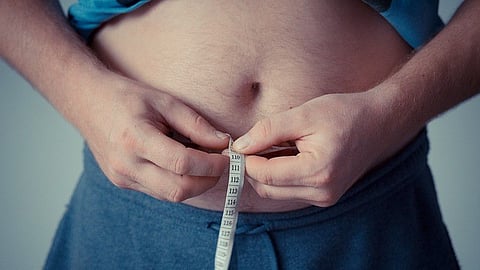

A recent study by Mumbai-based bariatric surgeon Dr. Shashank Shah has revealed that low testosterone levels should be a criterion for weight-loss surgery. Published in the indexed journal 'Obesity Surgery,' this local study examined 134 males aged 18 to 30 with a BMI over 32.5 kg/m2. The findings revealed that six out of ten obese patients had low levels of the primary male hormone, testosterone.
Dr. Shah, the lead author, noted that this is the first such study from India, raising the question of whether testosterone deficiency should be considered an additional qualification for bariatric surgery. Low testosterone has been linked to obesity for years, as fat cells convert testosterone into estrogen, leading to a deficiency of the male hormone. This hormonal imbalance can also affect blood sugar conversion, increasing the risk of diabetes.
The study observed BMI, total and free testosterone levels, and clinical signs like gynecomastia (increased breast tissue in males), hypogonadism (impaired testicular function), and thinning pubic and armpit hair. It found that 60% of the patients had low testosterone levels, and another 20% had borderline counts. The study concluded that testosterone levels among obese young men tend to decrease as BMI increases.
Dr. Shah mentioned that many obese patients feel self-conscious about their breast size, often wearing jackets in the summer to cover up. Parents are also concerned about their sons' physical development being hampered by excessive weight. Dr. Shah suggested that the actual incidence of low testosterone and its effects in young adults might be higher than reported, calling for further research.
Testosterone, though primarily a male sex hormone, is crucial for emotional well-being. It impacts cognitive functions and the risk of depression in both men and women. Dr. Shah highlighted that testosterone is essential for enthusiasm, commitment, and compliance. A lack of these traits could indicate low testosterone levels.
The study proposes that testosterone deficiency should be included as a criterion for bariatric surgery, a stance supported by Dr. Randeep Wadhwan, president of the Obesity Surgery Society of India. He emphasized that testosterone levels are linked to obesity and diabetes, noting that a deficiency can lead to metabolic syndrome, characterized by high cholesterol, blood pressure, and blood sugar levels.
Dr. Wadhwan pointed out that weight loss can increase testosterone levels, but achieving significant weight loss (around 20%) is often challenging without surgical intervention. Bariatric surgery, he suggested, could help achieve this weight loss, thereby potentially boosting testosterone levels.
However, not all medical professionals agree. Senior endocrinologist Dr. Shashank Joshi argued that there is no scientific basis to link testosterone deficiency with bariatric surgery. He believes patients should be evaluated and treated by an endocrinologist based on evidence. Another senior doctor from a public hospital raised the concern that some men have low testosterone without being obese, questioning how weight-loss surgery could help such individuals.
(Input from various sources)
(Rehash/ Susmita Bhandary/MSM)
